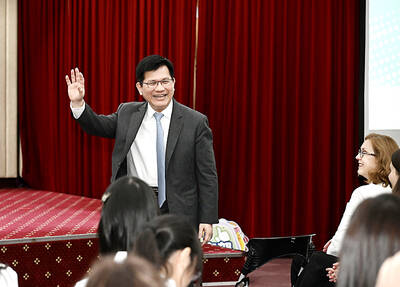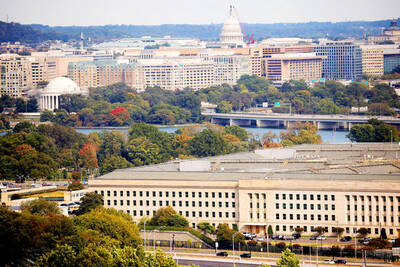Medical professionals and food safety experts have decried a Food and Drug Administration (FDA) proposal to legalize sulfur dioxide as a food additive, with one calling it meaningless and potentially misleading.
Sulfur dioxide is an allergen that could cause stomach and bowel irritations or in severe cases trigger asthma attacks, physician Yan Tzung-hai (顏宗海), a clinical toxicology specialist at Linkou Chang Gung Medical Hospital, said on Saturday.
Sulfur dioxide is an unintended chemical byproduct from sulfites, legal additives commonly added to preserved foods for freshness and color, said Hsu Tin-chen (許庭禎), a professor of food science and technology at Taiwan National University.
Their comments came in response to the FDA’s announcement on Wednesday of its revised food safety regulations, which are set to take effect within 60 days after a period of public comment.
Wednesday’s preview said the agency is to classify sulfur dioxide as a food additive for many common products such as pickles, dehydrated fruits and vegetables, molasses and malt sugar, dried shellfish, animal-based gelatin and konjac yam derivatives.
Excessive sulfur dioxides has been one of the most common reasons that food products such as dried long yellow daylilies and dried shrimp have failed to pass the FDA’s food safety standards.
While some nations have legalized sulfur dioxide, the substance is used as a disinfectant during the manufacturing process and never a food additive, Yan said.
Since sulfur dioxide is a gas and cannot be directly added to the food itself, classifying it as a food additive contradicts the definition of the term, he said. “The FDA’s proposal to reclassify sulfur dioxide is meaningless and runs the risk of misleading the public.”
However, the FDA has defended its proposal.
Many manufacturers had asked the agency to reclassify sulfur dioxide, even though it is not actually added to food, so that they would not face fines for using sulfites, FDA official Wei Jen-ting (魏任廷) said.
Classifying sulfur dioxide as an additive would not affect regulations on the maximum safe levels of it in foods, he said, adding that sulfur dioxide levels in dried daylilies would still not be able to exceed 3g per kilogram.
The FDA’s proposal is to permit the use of sulfites and sulfur dioxide in marinated or fermented vegetables, categories that include most common cabbage or other leaf vegetable pickles, he said.
Sulfur dioxide is an approved food additive in the EU, the US, Canada, Australia and New Zealand and the WHO recognizes it as a preservative, so Taiwan should not be an exception, he said.

FIREPOWER: On top of the torpedoes, the military would procure Kestrel II anti-tank weapons systems to replace aging license-produced M72 LAW launchers Taiwan is to receive US-made Mark 48 torpedoes and training simulators over the next three years, following delays that hampered the navy’s operational readiness, the Ministry of National Defense’s latest budget proposal showed. The navy next year would acquire four training simulator systems for the torpedoes and take receipt of 14 torpedoes in 2027 and 10 torpedoes in 2028, the ministry said in its budget for the next fiscal year. The torpedoes would almost certainly be utilized in the navy’s two upgraded Chien Lung-class submarines and the indigenously developed Hai Kun, should the attack sub successfully reach operational status. US President Donald Trump

Taiwan Semiconductor Manufacturing Co (TSMC, 台積電) is expected to start construction of its 1.4-nanometer chip manufacturing facilities at the Central Taiwan Science Park (CTSP, 中部科學園區) as early as October, the Chinese-language Liberty Times (the Taipei Times’ sister newspaper) reported yesterday, citing the park administration. TSMC acquired land for the second phase of the park’s expansion in Taichung in June. Large cement, construction and facility engineering companies in central Taiwan have reportedly been receiving bids for TSMC-related projects, the report said. Supply-chain firms estimated that the business opportunities for engineering, equipment and materials supply, and back-end packaging and testing could reach as high as

ALL QUIET: The Philippine foreign secretary told senators she would not respond to questions about whether Lin Chia-lung was in the country The Ministry of Foreign Affairs on Wednesday confirmed that a business delegation is visiting the Philippines, but declined to say whether Minister of Foreign Affairs Lin Chia-lung (林佳龍) is part of the group, as Philippine lawmakers raised questions over Lin’s reported visit. The group is being led by Deputy Minister of Agriculture Huang Chao-chin (黃昭欽), Chinese International Economic Cooperation Association (CIECA) chairman Joseph Lyu (呂桔誠) and US-Taiwan Business Council (USTBC) vice president Lotta Danielsson, the ministry said in a statement. However, sources speaking on condition of anonymity said that Lin is leading the delegation of 70 people. Filinvest New Clark City Innovation Park

DEFENSIVE EDGE: The liaison officer would work with Taiwan on drones and military applications for other civilian-developed technologies, a source said A Pentagon unit tasked with facilitating the US military’s adoption of new technology is soon to deploy officials to dozens of friendly nations, including Taiwan, the Financial Times reported yesterday. The US Department of Defense’s Defense Innovation Unit (DIU) is to send a representative to collaborate with Taiwan on drones and military applications from the semiconductor industry by the end of the year, the British daily reported, citing three sources familiar with the matter. “Drones will certainly be a focus, but they will also be looking at connecting to the broader civilian and dual-use ecosystem, including the tech sector,” one source was